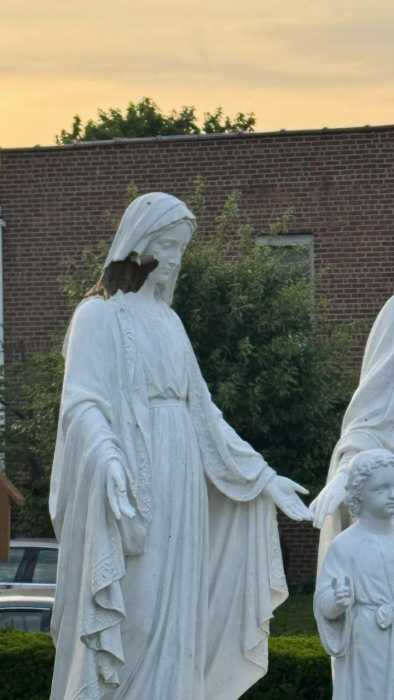Brothers Smuggled Mexican Victims As Slaves
Three brothers were sentenced last Friday, Feb. 7, to lengthy federal prison terms following their guilty pleas to sex trafficking charges, it was announced.
Benito Lopez-Perez, 34, and Anastasio Romero-Perez, 40, were sentenced to 18 years of imprisonment to be followed by five years of supervised release. Additionally, Jose Gabino Barrientos-Perez, 52, was sentenced to 10 years and one month of imprisonment, to be followed by five years of supervised release.
The defendants, who are Mexican nationals, transported Mexican females from Mexico to the United States illegally, forcing them to work as prostitutes in New York City and elsewhere. They were arrested in Mexico in October 2011 and extradited to the United States in December 2012.
The sentences are the latest in a comprehensive anti-trafficking program by the Office of the U.S. Attorney for the Eastern District of New York which has, to date, indicted over 55 defendants in sex trafficking cases and rescued over 100 victims, including 17 minors.
The sentences were announced by Loretta E. Lynch, United States Attorney for the Eastern District of New York, and James T. Hayes, Jr., Special Agent-in-Charge, U.S. Immigration and Customs Enforcement, Homeland Security Investigations (HSI), New York.
“The defendants preyed upon the young and vulnerable, abducting one of their victims at age 14, and forcing them into a life of sexual slavery in Mexico and the United States. Working together with our law enforcement partners at home and abroad, we stand firm in our resolve to vigorously investigate and prosecute those who would subject others to modern-day slavery,” Lynch said last Friday. “These sex traffickers have now been held to account for the horror and violence that they inflicted on their victims. We hope that these sentences bring some measure of closure to the victims as they attempt to heal from the mental and physical abuse inflicted by the defendants.”
“The individuals sentenced today exploited and enslaved women for personal profit while terrifying and traumatizing them through rape, violence and intimidation,” added Hayes. “No prison sentence can ever do justice for the pain and suffering experienced by these victims, but knowing that justice has been served on their tormentors will hopefully allow for the beginning of a healing process that these women so justly deserve.”
The sex trafficking involved at least four victims, and the defendants used various methods to force these women and girls to work in prostitution, ranging from abduction, rape, assault and threats of violence to psychological coercion.
One minor victim, identified in court papers as Jane Doe 1, was primarily trafficked by Lopez-Perez. Jane Doe 1 met Lopez-Perez in 2005 in Mexico when she was 14 years old. After attending a movie with a group that included Lopez-Perez, he took Jane Doe 1 to his family home and raped her.
Lopez-Perez then forced Jane Doe 1 into prostitution, first in Mexico and later, after arranging to smuggle her across the border, in the United States, where Barrientos- Perez also participated in the victim’s sex trafficking.
Jane Doe 1 was required to service 10 to 40 clients per day, on threat of physical abuse, and was kept under the defendants’ control for five years until she escaped in 2010.
At age 14, the victim identified as Jane Doe 2 met Romero-Perez while she was living with her sister (also a victim and identified in court papers as Jane Doe 3), who was married to Barrientos-Perez. Jane Doe 2 began a romantic relationship with Romero-Perez, who subsequently persuaded the victim to work as a prostitute to pay off a debt.
Romero-Perez brought Jane Doe 2 to a bar where she was closely monitored to ensure she kept none of the money she earned. When she refused to work, or did not earn enough money, Romero-Perez beat her. In approximately October 2008, Romero-Perez and Lopez-Perez arranged to smuggle Jane Doe 2 into the United States where she was forced to work as a prostitute in New York, New Jersey and Connecticut, servicing approximately 12 to 15 clients per day.
While she was in the United States, Romero-Perez raped and beat Jane Doe 2 on several occasions.
Jane Doe 3 was primarily trafficked by her husband, Barrientos-Perez. Approximately one year after the birth of their son, Barrientos-Perez persuaded Jane Doe 3 to work as a prostitute, telling her he needed the money pay off debts and to provide for their baby. Barrientos-Perez brought Jane Doe 3 to Tijuana and Mexico City to work in prostitution, beating her on several occasions in order to force her to work.
In 2006, Barrientos-Perez arranged to smuggle Jane Doe 3 into the United States and ultimately to New York City to work as a prostitute under the defendant’s threats of violence. Jane Doe 3 paid Barrientos-Perez approximately $700-$1,000 per week from her prostitution earnings-when she paid less, the defendant threatened that he would not let her see her children.
Jane Doe 4 was trafficked by Romero-Perez beginning at the age of 20, after she was pressured into a romantic relationship with him. After approximately three months of working as a prostitute in Mexico, Jane Doe 4 was smuggled into the United States. Romero-Perez promised his victim that they would get jobs and have an apartment together, but after they arrived, Romero-Perez told her that she needed to prostitute herself to support them.
Like the other victims, Jane Doe 4 gave the majority of the prostitution proceeds to Romero- Perez and his family members.
Since 2009, the Departments of Justice and Homeland Security have collaborated with Mexican law enforcement counterparts in the Procuraduría General de la República (PGR), the Secretaría de Seguridad Pública (SSP), Procuraduría Social de Atención a las Víctimas de Delitos (PROVICTIMA), and nongovernmental partners in the United States and Mexico in a Bilateral Human Trafficking Enforcement Initiative.
Through this Initiative, the United States and Mexico have worked together to bring high-impact prosecutions under both U.S. and Mexican law to more effectively dismantle human trafficking networks operating across the U.S.- Mexico border, prosecute human traffickers, rescue human trafficking victims and reunite victims with their families. Other significant bilateral cases have been prosecuted in Atlanta, Georgia, and Miami, Florida.
Lynch extended her grateful appreciation to the Department of Justice’s Office of International Affairs for its assistance in obtaining the extraditions of the defendants, and the NYPD for its longstanding partnership in the Office’s coordinated anti-trafficking program. She also thanked the many victim service providers and advocates for their dedicated efforts to restore and improve the lives of survivors of trafficking.
The sentences were imposed by Chief United States District Judge Carol B. Amon.
The government’s case was prosecuted by Assistant United States Attorneys Taryn A. Merkl, Elizabeth Geddes, and Erik Paulsen.



































